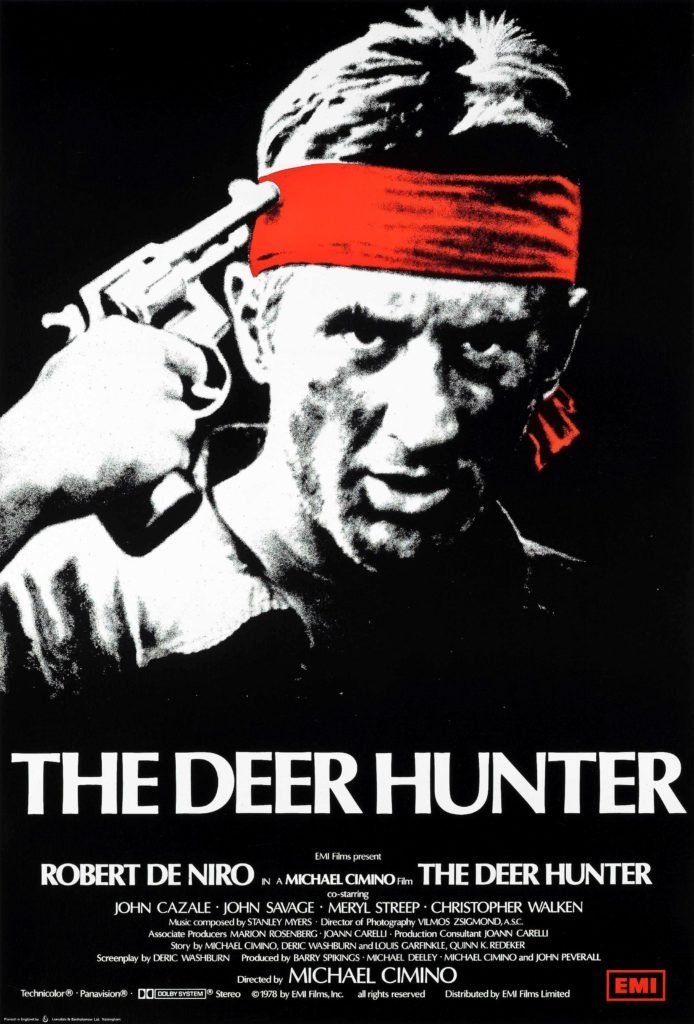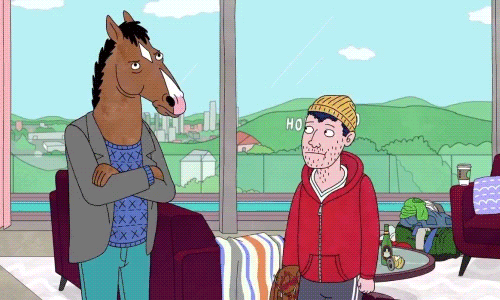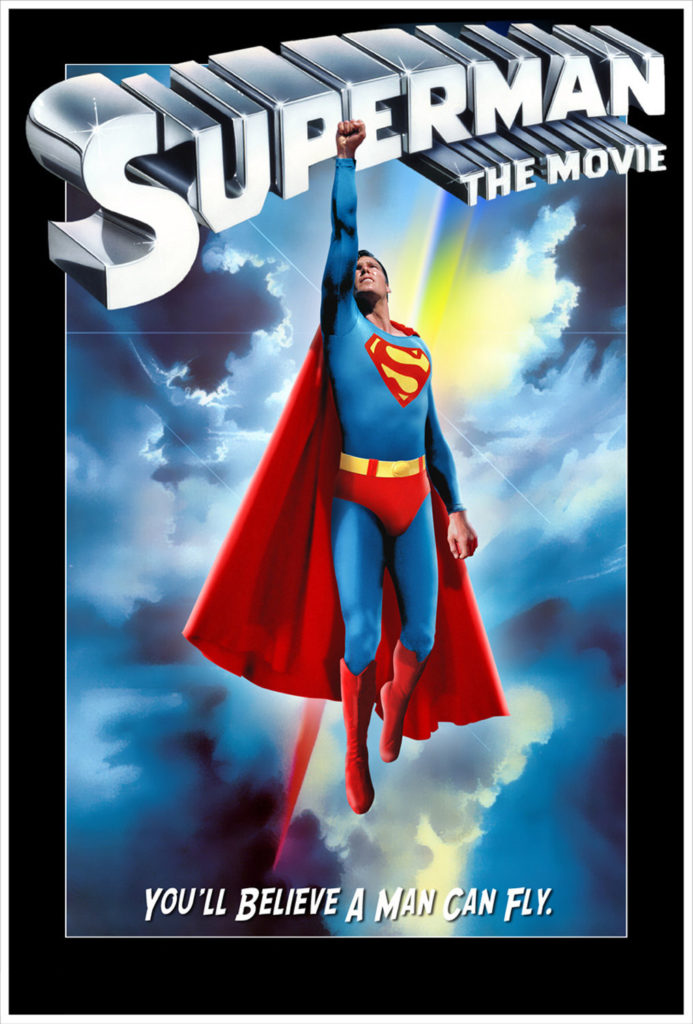1978
For most of the decade, the Oscars have been trying to be crowd-pleasing. Quirky comedy! Both installments of that mobster movie you liked so much! A heist movie with Butch and Sundance back together! And most of the time the audience found something else to get hyped over. Well, I guess the Academy got sick of the chase, because in 1978 they said “Enough of your tomfoolery, we’re getting serious again.” To the point where for the first time since 1966, the box office champ didn’t even get nominated for Best Picture. Yeah, that trash movie Hawaii, that’s how far back I had to go find a box office champ the Oscars snubbed. And before that you have to go all the way back to– wait, what? Spartacus? Are you sure? Huh. Huh. Well.
Anyway we’ll talk about the hit(s) that got snubbed in a minute but first let’s see what happens when the Oscars stop being whimsical and get real.
And The Oscar Goes To…
Robert De Niro, Meryl Streep, an award-winning turn from Christopher Walken! All in… a three hour movie about the trauma and lasting damage of the Vietnam War.
Yep, yep, the Academy was done with crowd-pleasers alright.
I’m not saying that movies shouldn’t be long. I have been ragging on length a lot, but only when the time is ill-used. The Godfather wasn’t much shorter than The Deer Hunter, but flew past because it was all gold. Conversely The Roman Scandals was an hour and a half but felt like an eternity. A two and a half hour YouTube video on a TV show you never watched can be so fun you watch it twice in a week, don’t judge me only God can judge me. My point is that The Deer Hunter uses its time poorly, and that, to me, gave it structural issues.
The Deer Hunter is a languidly paced movie about three steelworker friends who, shortly after one gets married to his pregnant fiancée (he wasn’t the father), are set to ship off to Vietnam. We very gradually get to know Mike Vronsky (Robert De Niro), Nick Chevotarevich (Christopher Walken, winning his first Oscar), and Steven Pushkov (John Savage) as Steve has a nice, long wedding, and the boys and their pals go for one last deer hunt and piss-up at the local bar. What I’m hinting at is that the first hour is really slow and not much happens. But then all of a sudden we’re mid-combat in Vietnam, and one scene later without any sort of transition all three are being held prisoner by the Viet Cong, that is a jarring shift in pacing, just jarring. It brings us to the movie’s most famous scene, Viet Cong soldiers forcing their prisoners to play Russian roulette, but it’s just out of nowhere. And only lasts 30 minutes. Michael’s back from Vietnam in under an hour, and then we settle in for a whole bunch of “coming home is tricky” drama, weirdly focussed on Michael, who has the easiest time. And was there really this much recreational Russian roulette in Saigon? Did people get hooked on playing it like Nick does and Mike almost does? That makes no sense. I do not feel compulsively re-enacting the worst moment of your greatest trauma is as universal a coping method as this movie claims. Another journey I wasn’t taken on so the destination is just confusing.
The problem with the pacing of this movie is that it utterly muddies any character arcs. We put in an hour and a bit into meeting our three leads and their pals, then jump-cut to some indeterminate point in their tour of duty. Almost nothing we learned seems applicable. Everyone seems like an entirely different person, but we just jumped over whatever made them like that. The relevant bits of the first hour– Steve’s a newlywed, Mike hunts deer and has a thing for Nick’s girl (Meryl Streep), Nick doesn’t want to be left behind in ‘Nam, the bit where a green beret at the wedding has no interest in their excitement to get to the front– it all could’ve been done in a third the time, after which the film could have had a less choppy second act, or just been under three hours, I’d have accepted either. And then the war is over and we’re in what feels like a third movie, still riddled with sudden time jumps, with characters that have nothing in common with the men we met, whose journey was skimmed over so fast we’re playing catch-up the whole time.
Examining how the Vietnam War wasn’t great for the soldiers and how the trauma followed them home is a good theme to examine, especially in ’78, but “the horrors the North Vietnamese inflicted on American soldiers” has… not aged great. I’m not saying American POWs weren’t treated poorly by their captors but… eh, the US wasn’t ready for “America did some messed up things in that war and shouldn’t have been there at all” yet.
This movie was Meryl Streep’s second, and definitely her breakout, getting her her first of many Oscar nominations. It was a big swing for co-writer/director Michael Cimino, who won directing and screenplay Oscars for it, then burned every scrap of goodwill he’d earned with the disastrous Heaven’s Gate*. He did a few movies after that but probably none you’ve heard of. It was also the final movie for John Cazale, best known as Fredo Corleone. The man made five movies, all of which were Best Picture winners or nominees. The studio tried to fire him when they found out he was dying of cancer on set, but Meryl Streep (his then girlfriend) threatened to walk, and De Niro personally paid to insure him. They had to film all of his scenes first, and he died shortly after wrapping, never having seen the final movie.
And that’s the saddest thing about The Deer Hunter right there. Poor John.
(*Critics hated Heaven’s Gate so much some of them turned on The Deer Hunter retroactively. Like the time a roommate of mine watched Meet the Feebles and shouted that he hated Lord of the Rings now.)
Ultimately, this movie spends too much time on the prologue, and it results in dizzying time jumps for the next two hours, I don’t care for that as structure. And the decision to focus on Michael, the least physically or mentally damaged of the three, wasn’t the best call. Nick’s journey needed a lot more focus if it was gonna make any sense.
And Rotten Tomatoes Says: They put it at #42, one spot over Rocky, and I’m sorry but that’s unacceptable to me, Zack Snyder’s The Best Years of Our Lives should not be over Cimarron, let alone Rocky.
What’s New, Hollywood? This wasn’t the first US movie about Vietnam, nor the best (not even the best in the late 70s), but it sure was a whole new approach to the war compared to John Wayne in The Green Berets.
So that won the big trophy, plus Director and Supporting Actor. But after the Academy gave Best Picture nominations to the robot shark, the burning building, the space wizards, and the young priest/old priest buddy pic, what blockbuster was the first in 12 years not to get a nod? Well, it’s the first case of a particular bias that would ultimately alter the category thirty years later.
The Box Office Champ
You guessed it, readers. Probably thanks to my ever-so-subtle hinting. The Oscars do not like superheroes. But I sure do!
Superman opens with curtains parting on a kid reading the first pages of Action Comics #1. Not since The Ten Commandments has a film started with that kind of “Oh man this is gonna be something” energy.
Directed by Richard Donner from a script written by, among others, Mario P– Mario Puzo? The author of The Godfather wrote a Superman script and they had someone else re-write it? What the hell… Superman follows the title character from the destruction of Krypton to his first go-round with the self-proclaimed “greatest criminal mind of our time,” Lex Luthor (Gene Hackman). And while I do prefer “Evil Businessman” Lex to “Genocidal Real Estate Scam Lex,” Hackman does well. He’s just behind Terrence Stamp giving us a sneak preview Superman II’s General Zod.
Christopher Reeve is perfect and still the best as Superman, sorry Henry Cavill fans and much love to Brandon Routh and Tyler Hoechlin, but he is, partially because puts the most work into making Superman and Clark Kent different enough that you can buy people not noticing they’re the same guy. Forty years later few superhero actors have so perfectly captured their character. Maybe Margot Robbie as Harley Quinn, or Chris Evans as Captain America… although in that case Evans is just so good and wholesome it’s hard to know where Evans stops and Steve Rogers begins. Lately it seems to go the other way: Deadpool’s style of humour just happens to be perfectly on-brand for Ryan Reynolds, Deadshot was re-written to better fit Will Smith, and it feels like Tony Stark (even in the comics) was made to fit Robert Downey Jr. and not the other way around. But Christopher Reeve is Superman.
John Williams’ score is just perfect. He’s had a lot of high-profile gigs this decade, even The Deer Hunter. And trying to name a “best John Williams score” seems like a fool’s errand, but come on, it has to be this or Star Wars, right?
And as meet-cutes go, it’s damn hard to top Superman catching Lois mid-air:
“Easy miss, I’ve got you.”
“You’ve got me? Who’s got you?“
It does have some issues, and sets some precedents that would be problems down the road. Such as…
- Too Much Origin. Christopher Reeve doesn’t turn up until 47 minutes into the movie. This was the first one, the OG Superhero tentpole movie, so the logic of walking us through Superman’s origins seems clear, but here in 2021 we’ve had so many origins. It might not be so bad if we could go two years without seeing Bruce Wayne’s parents gunned down in Crime Alley but apparently that’s too much to hope for, and now even Doctor Strange gets docked points for spending so much time on his origin, and they legit needed to.
- (Also “teen Clark” looks about 32, that’s awkward.)
- (Also he spends 12 years in the Fortress of Solitude doing post-grad studies with robot Jor-El? Who thought that up?)
- The Villain Is More Interesting. In this case, again, it makes sense: casting an unknown as Superman meant the character didn’t have the actor’s brand and baggage attached to them, the way Robert Downey Jr. arguably overpowered Tony Stark. But that meant they put established names in the mentor and villain roles, just like Star Wars did, so Gene Hackman goes over the title character on the marquee. And this kept going for decades: the Burton/Schumacher Batmans sold themselves on Jack Nicholson, Michelle Pfieffer, Jim Carrey, and Arnold Schwarznegger more than Michael Keaton, Val Kilmer, or George Clooney. In half of those movies Batman didn’t even get top billing, just like Superman.
- I will give Man of Steel this, it did not feel the need to have Russell Crowe’s Jor-El read off a list of what Superman’s powers will be like Marlon Brando does in two different scenes.
- Margot Kidder speaking the lyrics of the love theme, “Can You Read My Mind,” while flying with Superman, is hell of goofy, but led to an amazing parody scene in The Tick (the second live action one) so I’ll allow it.
- And turning back time by flying around the earth really fast isn’t the worst bonus power these movies gave him, but it’s up there.
Reeve and Hackman are great, and Brando’s good… but nearly 25 years after On the Waterfront Brando is getting lazy. Legends tell of him refusing to memorize his lines because it would “be less natural,” or saying that he didn’t even need to go to set, because Jor-El is an alien, so who know what he looks like? Brando could just record his lines and they could play them over a bagel or something. To which Donner and the Salkinds had to say “Um. We know what Kryptonians look like, they look like Superman.”
Still, despite all of that, it’s still a treat, and you can see how it’s still inspiring superhero film makers today. It’s not action packed, no, the one big action beat is Superman trying to stop California from falling into the sea. But what it lacks in action it makes up for in showcasing the sheer goodness of its hero, something Zack Snyder (and arguably some Marvel movies) failed to do. Like Jaws and Rocky, it’s a solid first movie in a franchise that starts getting really dumb in the third entry.
And Rotten Tomatoes Says: A 94% from critics. Viewers more used to modern effects and aesthetics dropped its audience score down to 86%, which… yeah, that “fly around the world to reverse time” thing is real goofy.
What’s New, Hollywood? Superheroes, up until this point, had merely been used in serials and big-screen adaptations of Adam West TV shows. Superman changed that. It took another decade for Hollywood to really put their backs into it, and after some weird-ass missteps another decade to find their footing, but here’s where it started.
Other Events in Film
- One of Superman’s unsung acts of heroism was beating Grease by a little under $2 million, letting me skip it. Grease made a ton of money, it’s a little iconic, I hate it. I hate it enough I might watch Cats twice more just so I’ve seen that movie more often than Grease. Might, I said might, don’t schedule an intervention yet. …Sunday afternoons are best for me, though.
- The iconic frat comedy Animal House takes the number three spot. I should watch that.
- Elsewhere in comedy, Cheech and Chong’s first movie, Up in Smoke opens.
- Jaws 2 makes its inevitable arrival. Spielberg didn’t direct this one so it’s neither as good nor as lucrative.
- The Deer Hunter sneaks into the bottom of the top ten, but the most lucrative Best Picture nominee is Warren Beatty trying to bust out of paradise in Heaven Can Wait.
- John Carpenter creates an iconic villain and musical theme in Halloween.
- George Romero returns to zombies and takes on consumerism with the mall-bound Dawn of the Dead.
- I Wanna Hold Your Hand is the feature directing debut of Robert Zemeckis, who’s gonna do some very cool stuff in the 80s.
- Ralph Bakshi attempts an animated adaptation of The Lord of the Rings. It was supposed to be two movies, but it didn’t do great, part two never happens, so it just skids to a halt halfway through The Two Towers. I’d make a joke about Lord of the Rings being apparently unfilmable but come on, me, there’s being coy and there’s being dumb.
- Bakshi didn’t hold back when it came to animation for adults, but if you really wanna scar children with a cartoon, 1978 offered Watership Down.
- Jack L. Warner passes away. He hadn’t run Warner Bros. since 1969, and given how often it was bought, merged, and sold off over the years, I’m surprised he lasted that long. His inability to block Bonnie and Clyde or convince the director of Camelot to make even one good choice showed his influence had worn away, and he stepped aside. His career was controversial, but he outlasted and outlived every other Golden Age studio head.
- Clint Eastwood teams up with an orangutan in Every Which Way But Loose. That sentence is utterly bizarre but it worked well enough they made two of them?
- If you think we’re leaving 1978 without me mentioning the cult classic B-movie spoof Attack of the Killer Tomatoes, pal, you don’t know what blog you’re on.
- Starcrash is a key example of… why we’re not talking much about Star Wars knockoffs.
Next Page: Hoffman V Streep: Dawn of Justness



